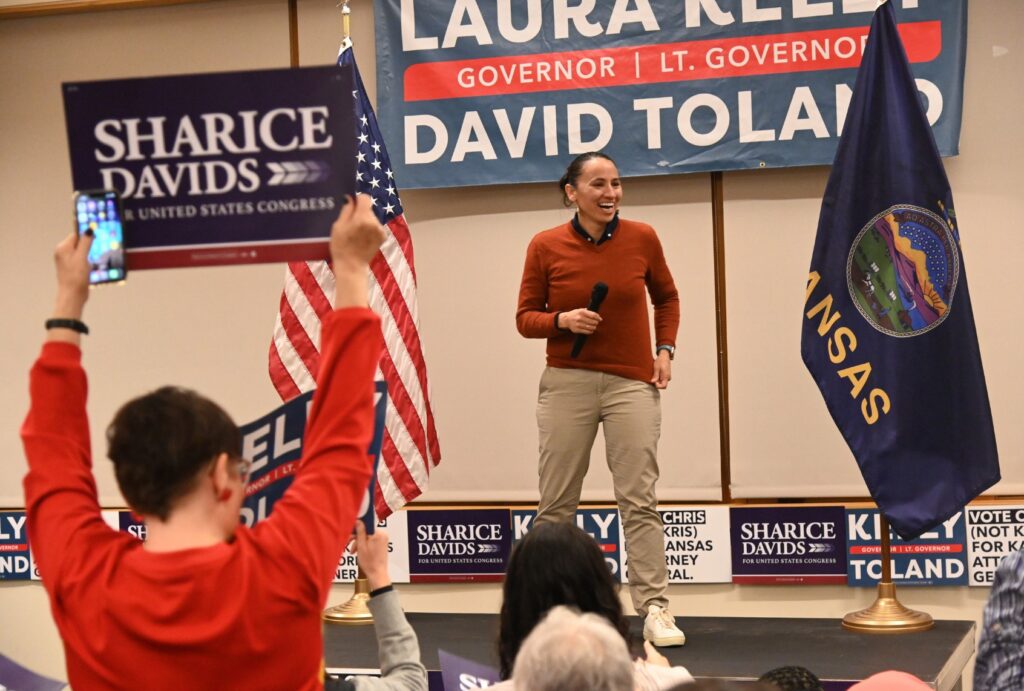
In a political landscape increasingly influenced by gerrymandering, Representative Sharice Davids from Kansas has managed to defy the odds. Despite significant redistricting efforts designed to dilute her support, Davids successfully won reelection in both 2022 and 2024, retaining her position as the only Democratic representative from the state.
Davids represents Kansas’s 3rd Congressional District, which encompasses a mix of rural areas and the urban landscape of the Kansas City metropolitan region. Following a 2022 redistricting effort by Republican lawmakers, her district was altered to include a more conservative electorate, effectively splitting the diverse and urban Wyandotte County in half. This strategy aimed to weaken her appeal within the district, as Republicans anticipated that voters would reject the liberal Democrat, who identifies as openly gay and is a member of the Ho-Chunk Nation.
Reflecting on the gerrymandering, Davids expressed her frustration, stating, “When they gerrymandered the Kansas maps… they essentially decided who their voters are. Voters are supposed to decide who their representatives are.” Despite Republican confidence in their redistricting strategy, former Senate Majority Leader Susan Wagle had boldly asserted that they could create four Republican congressional maps to ensure a statewide advantage. However, Davids countered this expectation by defeating her conservative opponent by a notable margin of 12 points.
Engaging with Voters
Davids attributes her electoral success to her active engagement with voters. She made it a priority to connect with constituents, particularly in the newly added parts of her district. “What I needed to do was continue figuring out how to bring the voices of the folks out to DC,” she explained. Her commitment to issues such as abortion rights, renewable energy, and criminal justice reform has resonated with voters, solidifying her base.
The political climate in Kansas remains volatile, as discussions of further redistricting have surfaced. Recently, Ty Masterson, the Republican Kansas Senate President, suggested the possibility of another round of redistricting to align with President Donald Trump‘s agenda, asserting that it is crucial for maintaining Republican power. This new push for redistricting reflects a broader trend seen in states like Texas and Missouri, where similar efforts have aimed to consolidate conservative dominance.
Davids expressed her outrage at the proposal, noting that the idea of revisiting redistricting has sparked significant anger among the electorate. “People are pretty pissed about the idea of revisiting the idea of redistricting,” she stated. The proposed changes could further fracture her support base in Johnson County, which has seen a notable increase in registered Democrats over the past nine years.
Challenges Ahead
Political analysts are closely monitoring the implications of potential redistricting efforts. Geoffrey Skelley, Chief Elections Analyst at Decision Desk HQ, explained that the Republican majority in the House is precarious, making them more likely to pursue gerrymandering tactics to secure an advantage. “Trump is looking for a way to give Republicans a better chance of power after the 2026 midterm elections,” Skelley noted, emphasizing the urgency behind these tactics.
The concept of “cracking,” where opposition voters are dispersed across multiple districts, is a tactic that could be employed against Davids. Samuel Wang, founder of the Princeton Gerrymandering Project, highlighted that mid-decade redistricting is rare and typically not justified. His project has critiqued the current Kansas districting plans, giving the state an overall F grade for fairness, with Davids’ district viewed as an outlier benefiting Republicans.
As Davids prepares for the challenges ahead, she remains committed to her approach of engaging with voters and advocating for their interests. “The most important thing we can all be doing is making sure as many people as possible know that our state’s legislators are looking at doing Donald Trump’s bidding,” she asserted. Her determination reflects a broader commitment to counteracting the effects of gerrymandering in the pursuit of fair representation.
In the face of adversity, Davids’ story serves as a testament to the resilience of democratic principles, highlighting the importance of voter engagement and advocacy in the ongoing battle against partisan manipulation. As Kansas continues to navigate its political landscape, the upcoming election cycles will undoubtedly test the limits of both voter sentiment and the strategies employed by those in power.






